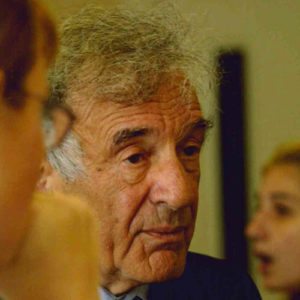When I first heard Dr. Wiesel had passed, I remembered being with him in Carolyn Johnston’s office in January of 2008.
We were having an argument.
He was sitting across from me, surrounded by books. His legs were crossed, his eyes were focused on mine, and the fingers of his left hand were rested on his lips and cheek—a pose that signified he was intently listening, and which had the added effect of making his untamable hair look even more like a prophet’s or a Hasidic Tzaddik’s—a Just Man’s.
Our argument was purely academic and artistic. I liked No Country for Old Men; he didn’t.
After I pleaded my case, he looked at me for a while, closed his eyes, then began asking questions. “Didn’t you think the plot was unbelievable? … Why would the villain be able to just walk away at the end? … Where was the justice in the film? … Where was the moral dimension?”
Admittedly, none of my answers were worthy of his questions, but being young and headstrong, I held to my position. At the end, Dr. Wiesel smiled and wished me a good rest of the day until we were to meet for class again.
Looking back, I can’t believe my cheek. What gave me the right to disagree with a Nobel Laureate, a published author, a social activist and a keen-minded philosopher like Elie Wiesel?
I could only do so because of the type of person he was. With me, and with all of his other students, Dr. Wiesel lifted us up to his level. He treated us as equals, and he considered himself a fellow—and perpetual—student.
Because no one could listen the way Dr. Wiesel listened. Whether he was listening to students or professors, presidents or preschoolers, Elie Wiesel listened with his whole soul. Some people are engrossing talkers; he was a captivating listener.
Because Dr. Wiesel made everyone who met him feel like he was a friend. “It may be hard,” he’d say, “but a person can live without love. A person cannot live without friendship.” By this measurement, he gave many, many people reason to live.
Because through Dr. Wiesel, I’d learned that asking questions and challenging authority, when done from a place of reverence and respect, creates a closeness even stronger than faith. He taught me that to wrestle with God is to embrace God, and to wrestle with our teachers’ opinions was to draw closer to our teachers’ souls.
Now that Dr. Wiesel is gone, I’ll never again be able to sit across from him and debate the merits of popular films. And yet (his favorite words were “and yet”), I am unspeakably grateful for those moments and for the legacy of words Dr. Wiesel left behind. Over the last few days, I’ve read through his books The Oath and Somewhere a Master, if only to hear his voice again. And when I have questions about what he means when he writes about Azrael’s silence, or if I take issue with his assertion that Pinchas of Koretz believed all people can bring about the coming of the Messiah, I feel closer again to Dr. Wiesel, my mentor, my teacher, my friend.
—Ross Cohen ’08


